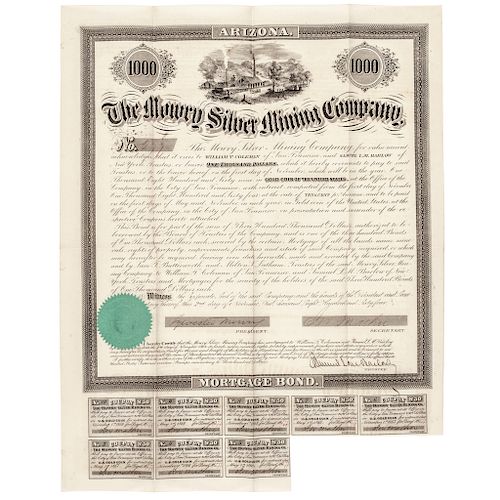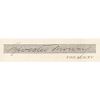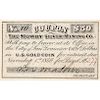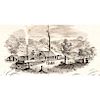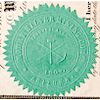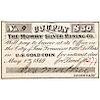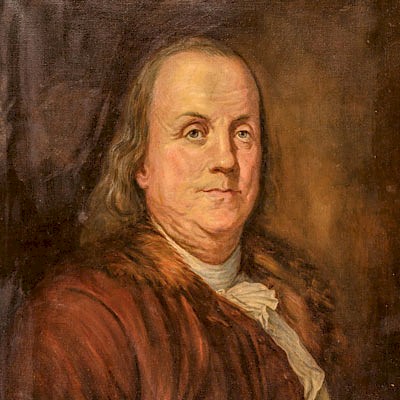1864-Dated SYLVESTER MOWRY Signed: THE MOWRY SILVER MINING COMPANY BOND, ARIZONA
Lot 68
Estimate:
$7,000 - $8,000
Absentee vs Live bid
Two ways to bid:
- Leave a max absentee bid and the platform will bid on your behalf up to your maximum bid during the live auction.
- Bid live during the auction and your bids will be submitted real-time to the auctioneer.
Bid Increments
| Price | Bid Increment |
|---|---|
| $0 | $10 |
| $200 | $20 |
| $300 | $25 |
| $500 | $50 |
| $1,000 | $100 |
| $2,000 | $200 |
| $3,000 | $250 |
| $5,000 | $500 |
| $10,000 | $1,000 |
| $20,000 | $2,000 |
| $30,000 | $2,500 |
| $50,000 | $5,000 |
| $100,000 | $10,000 |
| $200,000 | $20,000 |
| $300,000 | $25,000 |
| $500,000 | $50,000 |
About Auction
By Early American History Auctions
Aug 24, 2019
Set Reminder
2019-08-24 12:00:00
2019-08-24 12:00:00
America/New_York
Bidsquare
Bidsquare : Autographs, Colonial Currency, Political Americana, Historic Guns
https://www.bidsquare.com/auctions/early-american-history-auctions/autographs-colonial-currency-political-americana-historic-guns-4347
Historic Autographs • Colonial Currency • American Civil War Colonial Era • Revolutionary War • Political Americana • Black History Early American History Auctions auctions@earlyamerican.com
Historic Autographs • Colonial Currency • American Civil War Colonial Era • Revolutionary War • Political Americana • Black History Early American History Auctions auctions@earlyamerican.com
- Lot Description
Autographs
"THE MOWRY SILVER MINING COMPANY" BOND "Few men did more for Arizona during its early history than Sylvester Mowry"
SYLVESTER MOWRY (1830-1871). (Arizona Statehood & History) 1850s Silver Miner, Womanizer & early Arizona Statehood Advocate, this Controversial Soldier, Miner, Western America "Booster" and Entrepreneur Seduced Brigham Young's Daughter-In-Law! Brigham Young himself took a strong dislike to Mowry. Appointed by President James Buchanan as a Commissioner to establish the Border between California and Nevada.
November 2, 1864-Dated Civil War Period, Historic and Extraordinary ARIZONA RARITY, Ornately Engraved Partially-Printed Document Signed, "Sylvester Mowry" as President of "THE MOWRY SILVER MINING COMPANY," measuring 17.25" x 13.75" (430 mm x 350 mm), 1 page, San Francisco, Crisp Fresh Near Mint. This being a $1,000 Mortgage Bond "No. 277" containing eight original, Signed and fully Attached Coupons at the bottom of the page (two of the coupons detached). Vitually Mint but for being folded for storage, this Bond is bright and fresh with two coupons actually having been clipped for redemption.
This rather spectacular item of Arizona and the colorful life of Sylvester Mowry. He being the controversial soldier, miner, entrepreneur, Arizona booster, and alleged "con artist." Sylvester Mowry has his own unique story. He was an American best known as a pioneer and the founder of Mowry, Arizona. In 1860, Mowry was appointed by President James Buchanan a Commissioner to establish the border between California and Nevada, but he was removed in 1861 due to politics. During his time as commissioner, Mowry became interested in mining and prospecting and in 1860 he purchased the Patagonia silver mine just southeast of the Santa Rita Mountains in southern Arizona. After renaming it the Mowry Silver Mine, Mowry began constructing a mill and a smelter for extracting precious minerals. His small town was besieged by Apaches and it was virtually destroyed in 1863. His angry response was that they all needed to be unmercifully killed! He served as an officer in the United States Army and was arrested as a traitor during the American Civil War. No actual evidence could be produced and he was released.
This superb $1,000 Mortgage Bond was issued to William Tell Coleman (1824-1893), a prominent and early resident of San Francisco where he became a successful shipping merchant, running a Steamship Line to New York. Unfortunately for Coleman, the Bond was worthless. The Mowry Mine in Southern Arizona had been only intermittently productive.
From 1861 onwards, the Mine mostly ceased to function due to Mowry's arrest by Union authorities for treason, after letters requesting protection for his mine from Confederate authorities.
Always the fast operator, Mowry sold bonds in his mining operations to unsuspecting investors (who had no understanding of the actual state of the mine) enabling Mowry to lead a lavish lifestyle in San Francisco, New York and Arizona. It is unknown how many of these Mortgage Bonds he actually issued, but it would stand to reason that most of them were thrown out and/or destroyed in disgust following Mowry's death in 1871.
A true ultra-rarity from one of Arizona's most controversial early figures. This historically significant Mortgage Bond of Lt. Sylvester Mowry considered of museum quality. Collectors interested in the Southwest, or the history of Arizona and/or Mormon History should not pass up this unique opportunity. According to the Arizona Republic: "Few men did more for Arizona during its early history than Sylvester Mowry (1833-1871)... soldier and pioneer mining man...". An extensive explanation of this bond, its history and the personal story of Lt. Sylvester Mowry is found on our auction website at: www.EarlyAmerican.com. The Only Example of this Exceedingly Rare Arizona Bond we have ever encountered.
The Rhode Island-born Mowry graduated West Point in 1852 and came West under Colonel Edward Steptoe's expedition to explore routes for a Pacific Railroad. They arrived in Salt Lake City in 1854 to investigate the Gunnison Massacre, in which a 10-party expedition was slaughtered by a band of Pahvant Ute Indians in October of 1853.
Brigham Young himself took a strong dislike to Mowry, who etched his reputation as a hard drinking, hard gambling. Unabashedly a womanizing troublemaker, Mowry's place was chiseled in historical "stone" when he brazenly (and successfully, according to Mowry's own personal letters) seduced Mary Young, first wife to Brigham's eldest son, Joseph Angell Young, who was in England on mission at the time! The ensuing scandal convinced Colonel Steptoe to order Mowry from leave Salt Lake, transferring him to Rush Valley, Utah.
Mowry was later stationed in Benecia, California and then Fort Yuma, which made such an indelible impression upon him that in 1857, he resigned his commission from the Army to peruse prospecting opportunities in the Arizona Territory, purchasing the Patagonia Mine that same year. In 1858, Mowry had himself elected as the "Official" Territorial Delegate to Washington, DC in order to lobby for Territorial recognition for Arizona, which was then part of the New Mexico Territory.
From 1857 to 1860 Mowry was, "... Arizona's most active champion of Territorial organization." However, on the eve of the Civil War, he departed the world of Territorial politics and devoted himself to mining activities. During the Civil War, Mowry played off both sides in order to obtain security against the Apaches, and his letters to Confederate officers tipping them off to Union troop movements landed him in trouble. Mowry lost control of his mine and was jailed in Yuma during his trial for Treason. He was released in August of 1862 after Union military authorities granted a general amnesty for Confederate sympathizers in Arizona.
His mining operations in total disarray, Mowry went to San Francisco to raise funds in order to fund his mine by issuing Mortgage Bonds. Just a month before he issued the present Bond, Mowry the mine for $2.5 million to Sam F. Butterworth and Milton S. Latham of San Francisco. However, the purchaser was Mowry Silver Mining Company which named Butterworh and Latham as the company's trustees. The company was still controlled by Mowry. This device placed the property out of reach of his wife, Laura A. Mowry, who had sued for divorce only a few days before.
Because Mowrey had sold his mine to his own mining company (no actually money was exchanged), he was still forced to purchase $2,400 in Official Goverment Revenue Stamps to affix to the deed of sale, demonstrating the "Proof' of the mine's supposed and claimed value. This allowed Mowry to inflate the value of any stock he sold in the mining company, enabling him to continue living a lavish lifestyle.
In particular the present bond was "...for part of the sum of Three hundred Thousand Dollars, authorized to be borrowed by the Board of Trustees of the Company and is one of the Three Hundred Bonds for One Thousand Dollars each, secured by the certain Mortgage of all the lands, mines, minerals, rights of property, improvements, franchises and estate of said Company acquired, or which may hereafter be acquired, bearing even date herewith, made and executed by the said Company and by Sam F. Butterworth and Milton S. Latham, Trustees of the said 'Mowry Silver Mining Company,' to William T. Coleman of San Francisco, and Samuel L. M. Barlow of New York, Trustees and Mortgages for the security of the holders of the said Three Hundred Bonds of One Thousand Dollars each.
Mowry returned to Arizona in late 1864 and stayed until 1866 taking one more stab at running the mine. After this point, the mine was, but Mowry continued to live high on the hog, likely selling bonds like these to unsuspecting investors. In 1871 Mowry became quite ill and travelled to London to consult a specialist. He died on 17 October 1871. The Mowry mine sold at auction in 1874 for $14,000 to Nathan B.Appel.
According to historians, Apple did not die a rich man. Constance Altshuler concluded: "Apparently no one acquired wealth from that mine except Sylvester Mowry, but his scale of living could not have been maintained by profits from the irregular periods of mining operation. He was, to put it blunt, aconfidence man, unscrupulous and totally self-centered."
References used include:
B. Sacks "The Creation of the Territory of Arizona," Journal of the Southwest (Spring, 1963), pages 32-34;
Constance Wynn Altshuler "The Case of Sylvester Mowry: The Charge of Treason," Journal of the Southwest (Spring, 1973), pages 63-82;
Constance Wynn Altshuler "The Case of Sylvester Mowry: The Mowry Mine," Journal of the Southwest (Summer, 1973, pages 149-174 and Ibid., page 173).
- Shipping Info
-
Early American provides in-house worldwide shipping. Please contact us directly if you have questions about your specific shipping requirements.
-
- Buyer's Premium



 EUR
EUR CAD
CAD AUD
AUD GBP
GBP MXN
MXN HKD
HKD CNY
CNY MYR
MYR SEK
SEK SGD
SGD CHF
CHF THB
THB